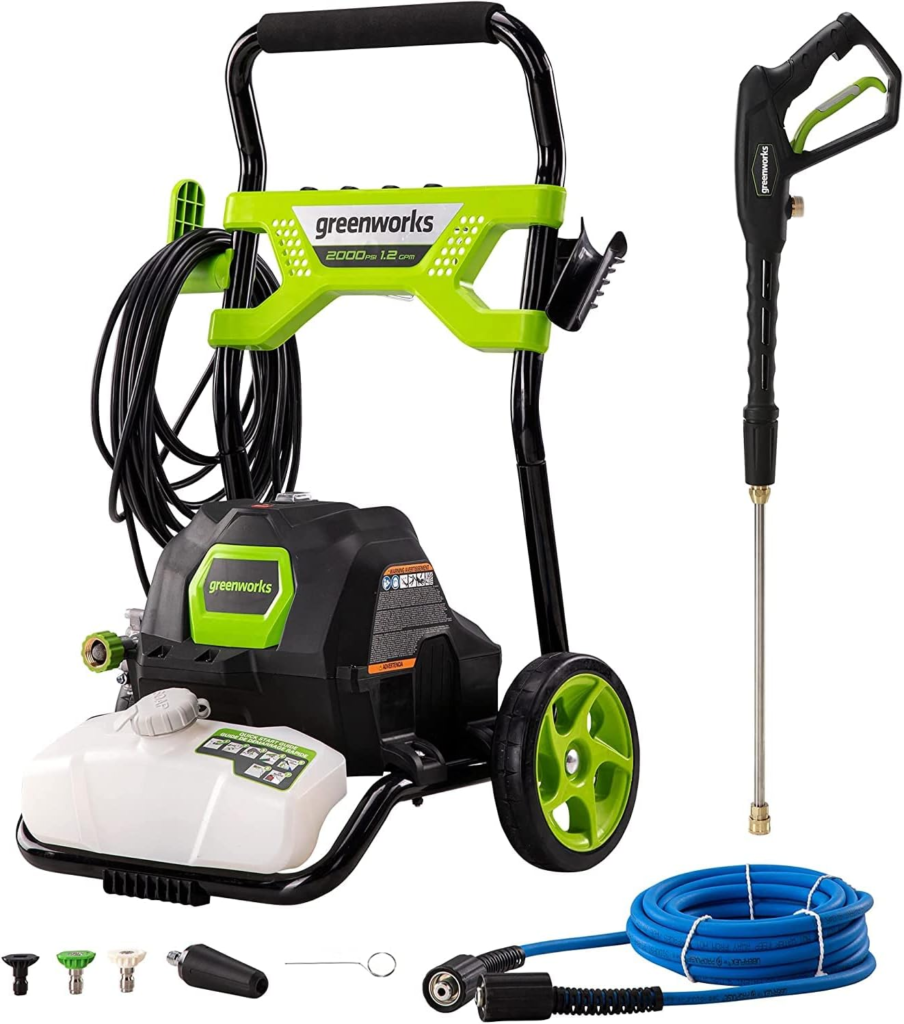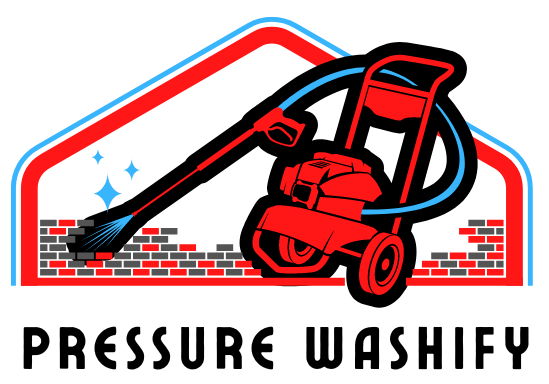Affiliate Disclaimer: This post may contain affiliate links, meaning we get a commission if you decide to make a purchase through our links, at no extra cost to you.
Let’s face it: our concrete surfaces endure quite a bit! From daily wear and tear to harsh weather conditions, it’s no wonder that dirt, grime, and stains accumulate over time. This not only affects the appearance of our concrete driveways, sidewalks, and patios but can also weaken the concrete itself.
One of the most effective methods to maintain concrete surfaces is by using a power washer. These convenient tools release water at high pressure, making it easy to eliminate even the most stubborn dirt and grime.
If you’re wondering what PSI pressure washer is needed to clean concrete, then the simple answer is at least 2000 psi.
However, not all pressure washers are the same, and determining the right PSI (Pounds per Square Inch) is crucial for a successful cleaning process.
What PSI Pressure Washer to Clean Concrete Surfaces: PSI VS GPM
PSI (Pounds per Square Inch)?
PSI, or pounds per square inch, is a way to measure pressure. It’s a unit that tells us how much force is applied to an area.
When it comes to pressure washers, PSI is a crucial factor in determining how powerful the machine is and how effectively it can clean surfaces.
How PSI Impacts the Cleaning Power of a Pressure Washer
Well, the more PSI, the more force the water has when it hits the surface you’re trying to clean. For instance, concrete is a porous material that absorbs dirt and grime, so it requires a higher PSI to get rid of those stubborn stains.
On the other hand, wood is less absorbent, so it doesn’t need as much pressure to clean.
But don’t be fooled into thinking that a lower PSI will work just as well on wood as a higher one. The right balance of pressure is essential for effective cleaning without causing damage to the surface.
If you accidentally damage your concrete surface by pressure washing, read our guide here for concrete repair.
GPM
When it comes to pressure washer efficiency, it’s important to understand the relationship between PSI, and GPM (gallons per minute).
GPM refers to the amount of water your pressure washer uses per minute, and a higher GPM means your machine will remove dirt from surfaces faster.
It is essential to find the right balance between PSI and GPM. Using too much power on a surface can cause damage instead of effectively cleaning it.
High-pressure machines have lower flow rates. Low-pressure devices, on the other hand, provide higher throughput rates. However, they lack the force behind each shot of water.
Determining What PSI Pressure is Needed to Clean Different Concrete Surfaces
When you’re trying to figure out what PSI pressure washer you need to clean concrete surfaces, it’s important to think about the type of surface you’re dealing with and what it really needs in terms of cleaning.
Residential Concrete Surfaces: Driveways, Sidewalks, and Patios

The concrete surfaces you find around your home are driveways, sidewalks, and patios. These areas get exposed to everyday dirt, grime, and stains.
For residential surfaces, a pressure washer with a PSI between 2,000 to 3,000 should do the trick.
| Concrete Surface Type | Dirtiness Level | Pressure Washer PSI | Approximate Cleaning Time |
|---|---|---|---|
| Driveway | Light | 2,500 – 3,000 PSI | 30 – 45 minutes |
| Moderate | 3,000 – 3,500 PSI | 45 – 60 minutes | |
| Heavy | 3,500 – 4,000 PSI | 60 – 90 minutes | |
| Patio | Light | 2,000 – 2,500 PSI | 15 – 30 minutes |
| Moderate | 2,500 – 3,000 PSI | 30 – 45 minutes | |
| Heavy | 3,000 – 3,500 PSI | 45 – 60 minutes | |
| Garage Floor | Light | 2,000 – 2,500 PSI | 20 – 40 minutes |
| Moderate | 2,500 – 3,000 PSI | 40 – 60 minutes | |
| Heavy | 3,000 – 3,500 PSI | 60 – 80 minutes | |
| Sidewalk | Light | 2,500 – 3,000 PSI | 30 – 45 minutes |
| Moderate | 3,000 – 3,500 PSI | 45 – 60 minutes | |
| Heavy | 3,500 – 4,000 PSI | 60 – 90 minutes |
Commercial Concrete Surfaces: Parking Lots, Loading Docks, and Walkways
Commercial concrete surfaces, such as parking lots, loading docks, and walkways, experience more traffic and heavier loads.
This leads to dirtier surfaces and tougher stains to remove. For these surfaces, you might need a higher pressure washer of at least 3000 psi to get them clean.
Industrial Concrete Surfaces: Warehouses, Factories, and Heavy Equipment Areas
Industrial concrete surfaces, such as those in warehouses, factories, and areas with heavy equipment, face even tougher conditions. They have to deal with things like oil spills, chemical residues, and heavy machinery operations.
To clean these surfaces, you may need a pressure washer with a higher PSI, ranging from 4,000 to 7,000.
Best Pressure Washer for Concrete (Home Use)
Whether you’re a homeowner looking to spruce up your concrete driveway or patio, the Greenworks 2000 PSI 1.2 GPM Pressure Washer is an excellent choice for you. It’s efficient, easy to use, and reliable for medium-duty cleaning tasks. It boasts a pressure of 2000 PSI and a 1.2 GPM flow rate that ensures all dirt and grime are thoroughly removed from your surfaces.
The 14 AMP motor offers a powerful, yet easy start with a simple push of a button. It also comes with a soap tank for those heavy-duty tasks requiring a bit more cleaning power. With its ease of use, lightweight, and maneuverability, this electric pressure washer makes your outdoor cleaning jobs less daunting.
Factors Influencing the PSI Requirement for Different Surfaces
When you’re trying to figure out what PSI pressure washer you need for a concrete surface, there are a few factors you should consider:
- Stain Types: Different stains might need different pressure levels. For example, oil stains might require a bit more oomph than regular dirt or grime.
- Surface Age: Older surfaces might have more ingrained dirt and stains, so you might need a higher PSI pressure washer to get them clean.
- Surface Condition: The condition of the concrete surface is also important. If it’s damaged or cracked, you might need a lower PSI to avoid making it worse. On the other hand, if it’s well-maintained, it can handle higher PSI levels.
The Role of Detergent in Concrete Cleaning
Detergent is like the secret weapon for concrete cleaning. It helps break down stubborn oil, grease, and other stains on your concrete surface, making it easier for water or steam cleaning methods to wash them away.
So, when you’re tackling a greasy or oily concrete floor, don’t forget to use detergent to give it that extra cleaning boost!
Choosing the Right Nozzle for Your Pressure Washer
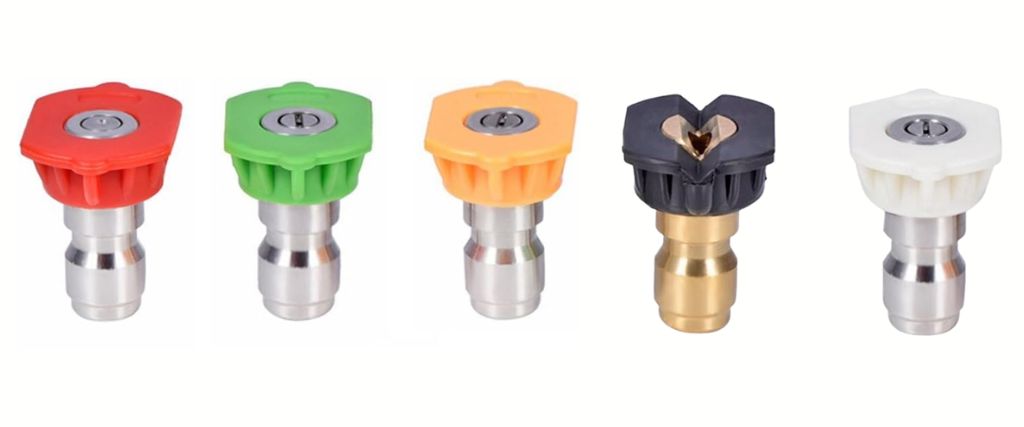
Picking the right nozzle for your pressure washer is essential for effective concrete cleaning. There are a few types of nozzles, like flat fan, high pressure, low pressure, and rotary oscillating.
To choose the perfect nozzle, consider the kind of job you need to do. If you’re cleaning large areas, go for a high or low-pressure nozzle. But if you need precision for smaller areas or corners, a rotary oscillating nozzle is the way to go.
Read more about nozzle selection here.
Using Surface Cleaners
Surface cleaners help in pressure washing concrete surfaces. They ensure even distribution of water pressure for efficient cleaning. Unlike regular nozzles, they don’t leave streaks or unclean patches.
They cover a larger area with rotating jets, reducing cleaning time and improving results. Plus, they use less water and minimize debris scatter, offering an eco-friendly cleaning solution.

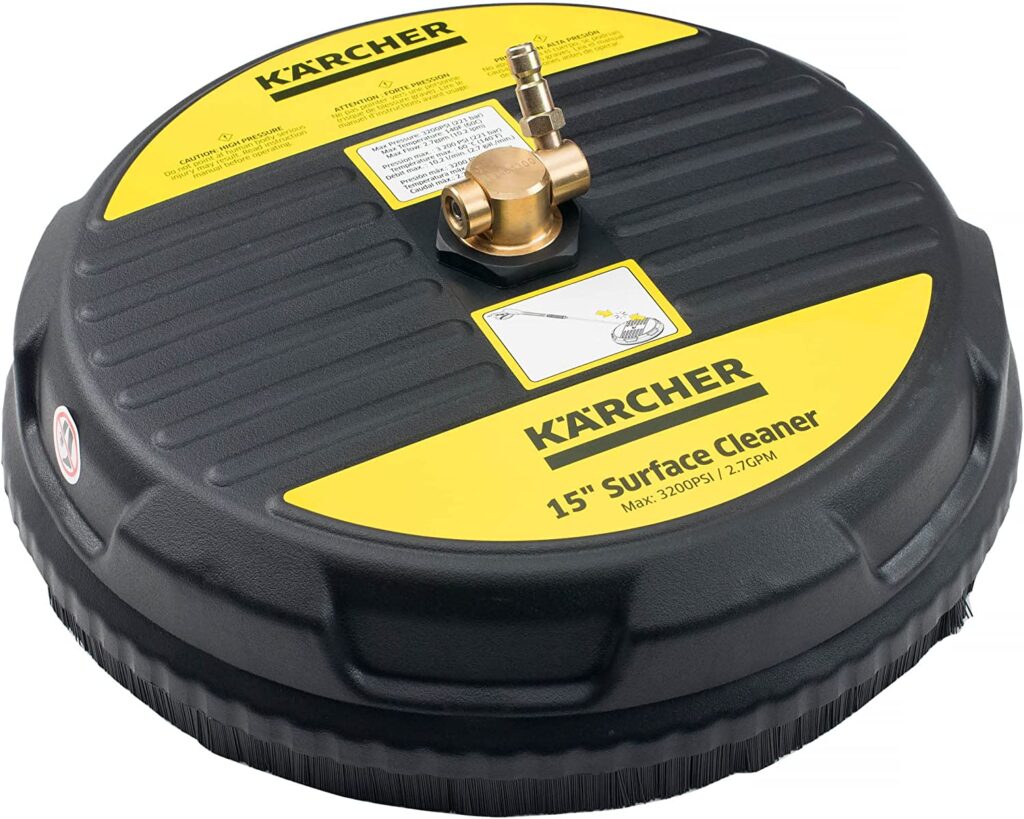
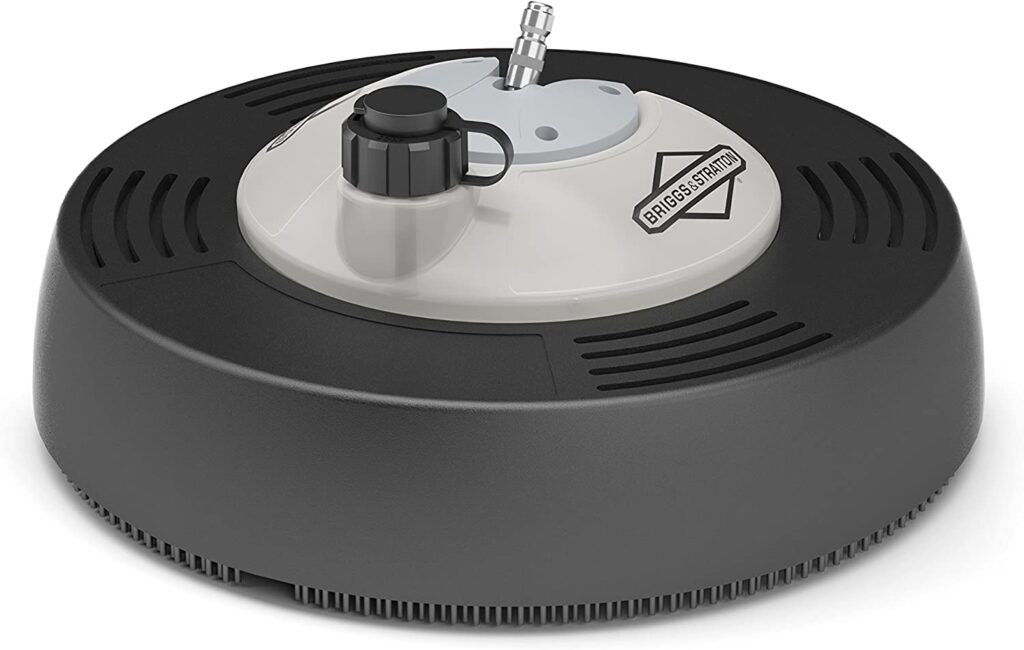
Conclusion
To wrap it up, determining a suitable psi pressure washer to clean concrete surfaces is crucial to achieving the best results. The PSI needed depends on the level of dirt and the type of surface being cleaned.
It’s important to avoid using a pressure washer with too high of a PSI as it can damage your concrete, and one with too low of a PSI won’t effectively clean the surface.
However, always prioritize safety and wear protective gear when operating a pressure washer.
FAQs
What is the minimum PSI needed for effectively cleaning concrete surfaces?
To effectively clean concrete surfaces, a minimum of 3000 PSI is often recommended for a residential pressure washer. Commercial-grade pressure washers may have higher PSI settings, which are suitable for deep cleaning and removing stubborn stains on concrete.
Can a higher PSI pressure washer damage concrete, and how do I prevent it?
Yes, pressure washers with a PSI above 3500 can potentially damage concrete if not used correctly. To prevent this, always begin with a wider fan pattern nozzle at a greater distance from the surface, gradually moving closer as needed while constantly moving the wand to avoid concentrated pressure in one spot.
How do PSI and GPM relate when choosing a pressure washer for concrete?
PSI (Pounds per Square Inch) measures the pressure of the water stream, while GPM (Gallons Per Minute) indicates the flow rate. For concrete, a higher PSI is crucial for breaking the bond between the dirt and the surface, while a higher GPM helps flush away debris more quickly. An ideal pressure washer for concrete will have a balanced combination of both high PSI and GPM.
What PSI pressure washer would professionals use for commercial concrete cleaning?
Professionals typically use pressure washers with a PSI ranging from 3500 to 4200 for commercial concrete cleaning. These high-pressure machines are efficient at removing heavy build-up, oil stains, and graffiti while ensuring time efficiency for large-scale projects.
Is variable PSI important for pressure washers used on concrete, and why?
Yes, having a pressure washer with variable PSI is beneficial when cleaning concrete as it allows the operator to tailor the pressure based on the cleaning task. Lower PSI can be utilized for washing away loose dirt, while higher PSI settings can tackle ingrained stains and residues. This versatility is especially useful when working with decorative or stamped concrete that may require a gentler approach.


